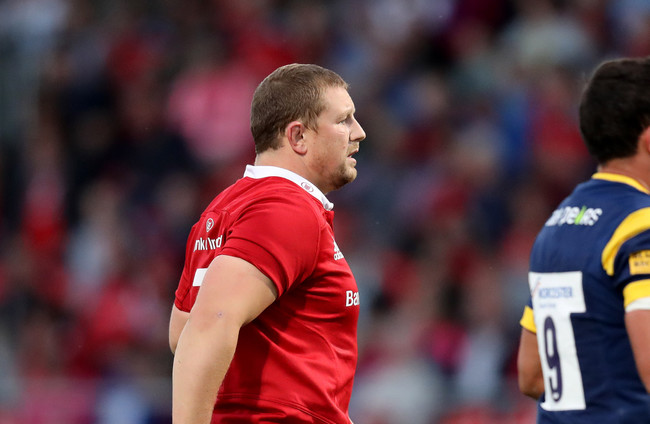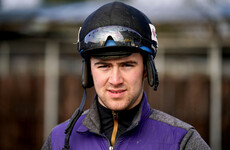ANYONE WHOSE PLAYING career concludes by working under Rassie Erasmus and Pat Lam can count themselves lucky, even if they were only brief spells at Munster and Connacht in John Andress’ case.
The tighthead prop returned home to Ireland at the end of a career that had seen him play for Harlequins, Edinburgh, Worcester, and Exeter, where he had two spells.
The Ulster native is now an agent with Edge Rugby Management and his experiences with Munster and Connacht are just part of an intriguing journey through the game as a player. All of it feeds into his current job.
Having impressed in his first spell with Exeter, Andress actually had a chance to join Munster back in 2009 before opting for a move to Dean Richards’ Harlequins.
By the time he did sign for Munster in 2015, his body was pretty much broken and he never got a chance to play a competitive game for the province due to injury. It was a frustrating six months or so but Andress still reflects on it positively.
“I wished I was 25 again because it was an absolutely brilliant bunch of lads and Rassie is a phenomenal coach,” says Andress.
“I couldn’t speak any better of the place. I actually learned a lot from being there and watching how Rassie and some of the players operated. It was kind of like Exeter, very honest where boys put their hand up and said they’d fix things.
“It’s fascinating seeing someone like Rassie coaching. He was so straight up. He told me, ‘Your knee isn’t great, I can see it when you’re moving, I didn’t sign you. If the scrum’s not going well, I will look to involve you but if it is going well, I’ll look at other players.’
“He was very honest and then also, my son had been diagnosed with autism at the time. Rassie came and saw me, said that he could link me up with people who had experiences in that area. They were really great people in Munster.”
Andress announced his retirement in December 2016 but just a couple of weeks later, Connacht were in dire straits with their prop stocks. Pat Lam needed a tighthead and Andress reckoned he could convince his body to battle on for a few more games.
“I got to play against Munster that New Year’s Eve and it was almost like proving a point to me in my own head.
“Pat was really interesting too, so I finished my career under two of the best coaches in the world. It was tough but at the same time, I was fortunate.
“We were very lucky with Ollie that we were down south because down south, they diagnose kids with autism earlier than in the UK. We were able to get him treatment, so we were very fortunate.”
The value of leaders like Erasmus and Lam is something that Andress continually comes back to in discussing his career and his work now as a rugby agent.
He burst onto the radar as an Ireland U19 and U21 international but never broke into the senior team at his native Ulster, instead departing for Exeter in 2007 to make a career for himself in England.
“When I was younger, I was very much my own man and Ulster would have been pretty conformist at the time,” says Andress. “I would have been in trouble when I was younger, boisterous, and got in a few scraps. I would have had a reputation for that and it sort of carried with you.
“It was expected I would make it through but Allen Clarke and I never got on and unfortunately, he got the forwards coach gig at Ulster.
“We had a bit of a bust-up at Irish 19s and it just wasn’t going to happen. The writing was on the wall.”
So Andress upped sticks and headed for Exeter, who were in the second-tier Championship at the time. He took to it like a fish to water.
Rob Baxter was his forwards coach in Exeter and Andress is a huge fan of his coaching style, highlighting how the Exeter supremo gets the best out of players who other coaches might deem not to be the right sort of characters for their club.
“The best guys like Rob, even if you have a dispute with them, they will still select the best team. With the shit coaches, that’s not quite there.
“The thing that shocks me about a lot of clubs now is that they label players as difficult and don’t want to take a punt on them at all.
“In my day, difficult was going out having a few scraps or a few beers. Difficult now is something like a player not having a good relationship with the physio! A lot of coaches now want choir boys. The funny thing is that the top environments are the ones who will take a punt on a so-called ‘difficult character.’
“There’s a mentality in rugby now where coaches have nearly got a bit arrogant. They think they’re professors of the game and their systems are what win matches, that if boys just stick to their roles, they’ll win.
“At the end of the day, your players are what win you matches. Coaches just want players to do as they’re told because they will stick to those structures. But so many of those coaches don’t win anything. They just don’t want to manage people.
“Fans love players who come out and show a bit of character. That’s what will grab more people towards supporting rugby. There’s almost this subconscious control mechanism in rugby where it’s nearly frightening to grow the game too much.”
Andress excelled at Exeter to the point that he was called up to feature for Ireland A in 2009 while still a Championship player.
He was due to travel to the Churchill Cup with Ireland A that summer but suffered a slipped disk in his neck and, with his move to the Premiership with Harlequins set to take place, couldn’t go to the US.
Andress established himself as a Premiership player with Quins, had a season back in Exeter, and then two with Worcester before a two-year stint with Edinburgh. He played some excellent rugby but never got a call from Ireland.
“Look, I thought I was playing good enough rugby and Ireland didn’t have that many good tightheads floating about at the time,” says Andress. “It was frustrating but I look at it now and think I didn’t do myself any favours in other ways.
“It probably evened out in the end. I wouldn’t have had the career I had with some of the nights out on the piss and things like that, so I could sit and moan and groan about now getting Ireland caps but on the flip side, there have been far better players than me whose careers ended early. I’m not bitter or resentful about it at all.
“Everyone ends up taking their path in life and I really enjoyed my career. I learned a lot from experiencing the different environments and building all those connections.”
There were great experiences and bad ones for Andress.
His return to Exeter in 2011 was short-lived, even though Baxter wanted him to stay. The club put a three-year contract in front of him but Andress opted to move to Worcester instead.
“Worcester came in with quite a lot of cash,” he says. “I really regretted that decision from a rugby point of view. My agent at the time pushed the deal because he obviously wanted the money. I was 28 and it was stupid.
“I took the money but it was the biggest learning for me of my life in rugby. I realised not to be arrogant and think I could go somewhere and do well of my own accord. You have to value when you’re in a good system or culture, that if you go somewhere else it won’t necessarily be the same.”
Things started off well in Worcester under Richard Hill but Andress says unhappy players were soon working to oust the head coach and the club was relegated in 2014, with Andress moving on to Edinburgh.
His playing days ended in 2017 after five appearances for Connacht and Andress soon moved into agency, linking up with his cousin and best mate, former Ulster back row Roger Wilson, to form Edge Rugby Management.
Their shared experiences as players were the motivation to get the business up and running.
“Even the way our end of career was handled, you didn’t hear much from your agent and there was no helping you after,” says Andress. “You were like a used commodity so we just felt there was a gap in the market to be very player-focused.
“Some agents do sweet F-A at the end of your career so we got talking about helping players like that and we saw a gap in the market for agents who were completely player-focused.
“We felt like some agents, and I still do, don’t really fight for the player, they just build a relationship with the club. I don’t think that’s been good for rugby in general because there’s a bit of a delusion in rugby that the clubs have all the power, whereas the reality is that if your squad walks out on you, you don’t have a business.”
Andress takes care of some high-profile players like Lions prop Rory Sutherland, has recently helped Irish lock Jack Regan to secure a deal with the Ospreys, and also represents emerging young talents such as Ireland U20s scrum-half Nathan Doak.
He feels the best clubs to deal with are those run by people who have been successful in other businesses outside of rugby.
“I saw really good environments and how they were run, and I saw really poor environments and how they were run,” says Andress, who is also forwards coach at his home club, Belfast Harlequins.
“I realise that the really good environments all have a shrewd person as the CEO or owner.
“The big problem is that you sometimes have guys who played in the amateur era of rugby that haven’t been a success in the business world but come into jobs in rugby.
“What rugby needs is people like Mick Dawson in Leinster, who has been successful in the business world and comes in knowing how to run something properly.
“It’s no wonder the really good environments are run by really shrewd people. The more people like that involved in rugby, the better.”















Great to see a young talent like that coming through on the international scene, hopefully he goes from strength to strength and bring a few more along with him, they’re few and far between at the minute unfortunately
Top top article
Sit back and imagine being Declan Rice’s dad. Your two parents are Irish and you want to rear a kid who acknowledges how brilliant Ireland is. Produce this? Dream world stuff.
This boy is a legend. He’s third generation and he’s damn proud. In the days when we see Grealish itching for a. If money move, we ought to sit back and revel in this kid and his incredible potential. I always thought Grealish had the choice between being our hero and being tabloid fodder in England. Declan Rice knows which is better. All hail Rice.
According his boss these games are warm ups for his England call up